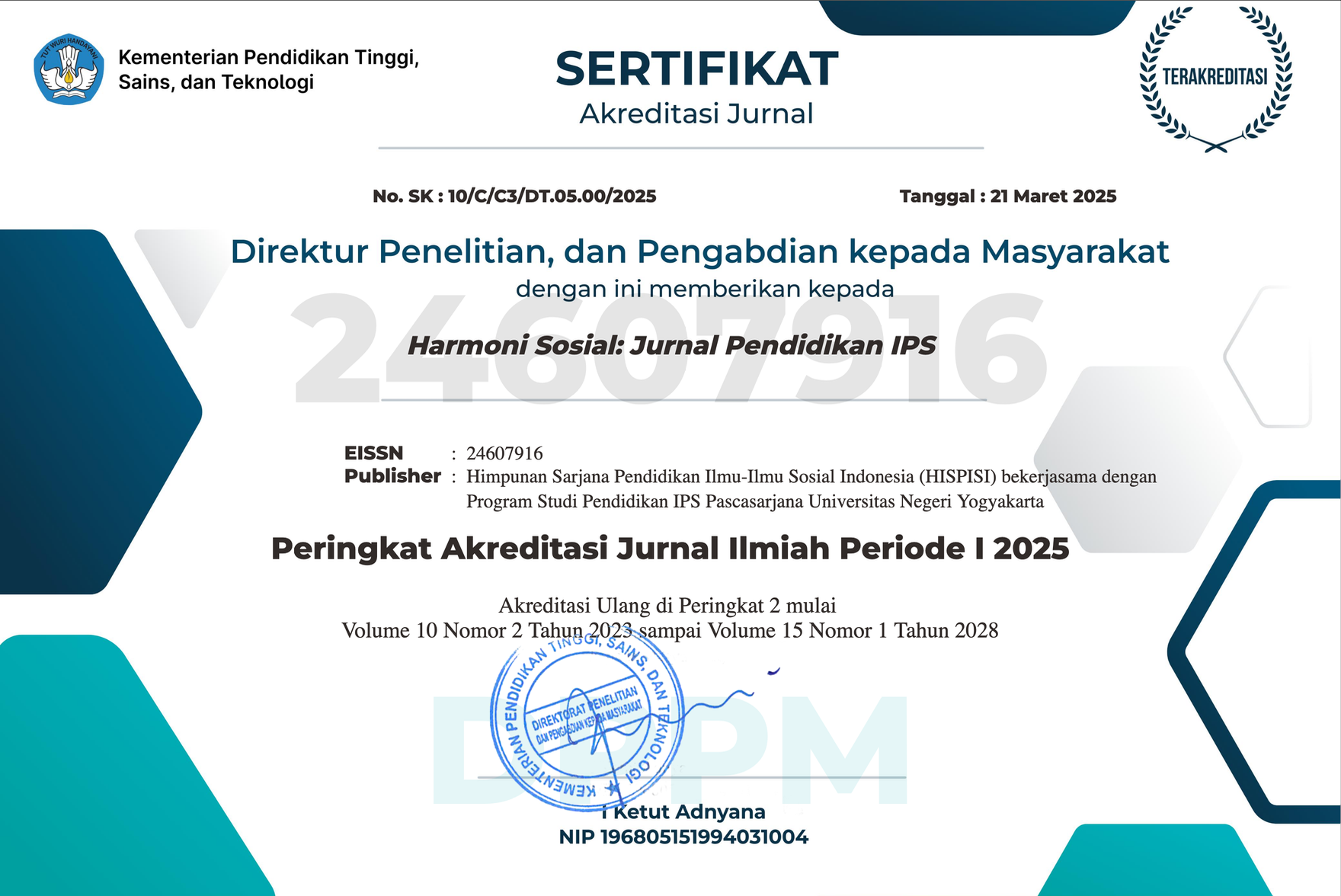The influence of literacy and numeracy learning in IPS subjects on students' 21st-century skills
Downloads
Downloads
Anas, M., Muchson, M., Sugiono, S., & Forijati, R. (2021). Pengembangan kemampuan guru ekonomi di Kediri melalui kegiatan pelatihan asesmen kompetensi minimum (AKM). Rengganis Jurnal Pengabdian Masyarakat, 1(1), 48–57. https://doi.org/10.29303/rengganis.v1i1.28
Anderha, R. R., & Maskar, S. (2021). Pengaruh kemampuan numerasi dalam menyelesaikan masalah matematika terhadap prestasi belajar mahasiswa pendidikan matematika. Jurnal Ilmiah Matematika Realistik, 2(1), 1–10. https://doi.org/10.33365/ji-mr.v2i1.774
Andiani, D., Hajizah, M. N., & Dahlan, J. A. (2020). Analisis rancangan Assesmen Kompetensi Minimum (AKM) numerasi program Merdeka Belajar. Majamath: Jurnal Matematika Dan Pendidikan Matematika, 4(1), 80–90. https://doi.org/http://ejurnal.unim.ac.id/index.php/majamath/article/view/1010/544
Anshory, I., & Utami, I. W. P. (2018). Pengantar pendidikan. UMM Press. https://eprints.umm.ac.id/45722/
Cruz, B. C., & Ellerbrock, C. R. (2015). Developing visual literacy: Historical and manipulated photography in the social studies classroom. The Social Studies, 106(6), 274–280. https://doi.org/10.1080/00377996.2015.1083932
Fauziah, A., Sobari, E. F. D., & Robandi, B. (2021). Analisis pemahaman guru Sekolah Menengah Pertama (SMP) mengenai Asesmen Kompetensi Minimum (AKM). EDUKATIF : JURNAL ILMU PENDIDIKAN, 3(4), 1550–1558. https://doi.org/10.31004/edukatif.v3i4.608
Galatea, C. K., Aprilia, F. N., Wicaksono, K. P., Kusuma, V. B., Adi, M. I., Faulin, A., & Sonda, E. A. (2022). The effectiveness of class management by using postersto increase literacy and numeracy skills. International Social Sciences and Humanities, 1(1), 32–35. https://doi.org/10.32528/issh.v1i1.33
Gunawan, R. (2021). Pendidikan IPS filosofi, konsep, dan aplikasi. CV Alfabeta.
Hasanah, M., & Hakim, T. F. L. (2021). Analisis Kebijakan Pemerintah Pada Assesmen Kompetensi Minimum (AKM) sebagai bentuk perubahan Ujian Nasional (UN). Irsyaduna: Jurnal Studi Kemahasiswaaan, 1(3), 252–260. https://www.jurnal.stituwjombang.ac.id/index.php/irsyaduna/article/view/344
Hernandez-Aguilera, J. N., Mauerman, M., Herrera, A., Vasilaky, K., Baethgen, W., Loboguerrero, A. M., Diro, R., Tesfamariam Tekeste, Y., & Osgood, D. (2020). Games and fieldwork in agriculture: A systematic review of the 21st century in economics and social science. Games, 11(4), 47. https://doi.org/10.3390/g11040047
Jan, H. (2017). Teacher of 21st century: Characteristics and development. Research on Humanities and Social Sciences, 7(9), 50–54. https://core.ac.uk/download/pdf/234675955.pdf
Kabul, K., Hakim, T. F. L., & Mubarok, A. (2023). Relevansi kurikulum pondok pesantren terhadap kompetensi santri di Abad 21 (studi kasus pada Pondok Pesantren Sunan Kalijaga Kabupaten Nganjuk). Journal Ability : Journal of Education and Social Analysis, 4(2), 112–124. https://www.pusdikra-publishing.com/index.php/jesa/article/view/1260
Laal, M., Laal, M., & Kermanshahi, Z. K. (2012). 21st century learning; Learning in collaboration. Procedia - Social and Behavioral Sciences, 47, 1696–1701. https://doi.org/10.1016/j.sbspro.2012.06.885
Nadjamuddin, A., & Hulukati, E. (2022). Kemampuan literasi numerasi mahasiswa dalam menyelesaikan masalah matematika. Jurnal Basicedu, 6(1), 987–996. https://doi.org/10.31004/basicedu.v6i1.1999
Nudiati, D., & Sudiapermana, E. (2020). Literasi sebagai kecakapan hidup abad 21 pada mahasiswa. Indonesian Journal of Learning Education and Counseling, 3(1), 34–40. https://doi.org/10.31960/ijolec.v3i1.561
Ojose, B. (2011). Mathematics literacy: Are we able to put the mathematics we learn into everyday use? Journal of Mathematics Education, 4(1), 89–100. https://www.educationforatoz.com/images/8.Bobby_Ojose_--_Mathematics_Literacy_Are_We_Able_To_Put_The_Mathematics_We_Learn_Into_Everyday_Use.pdf
Patriana, W. D., Sutama, S., & Wulandari, M. D. (2021). Pembudayaan literasi numerasi untuk asesmen kompetensi minimum dalam kegiatan kurikuler pada sekolah dasar Muhammadiyah. Jurnal Basicedu, 5(5), 3413–3430. https://doi.org/10.31004/basicedu.v5i5.1302
Perdana, R., & Suswandari, M. (2021). Literasi numerasi dalam pembelajaran tematik siswa kelas atas sekolah dasar. Absis: Mathematics Education Journal, 3(1), 9–15. https://doi.org/10.32585/absis.v3i1.1385
Rohim, D. C. (2021). Konsep asesmen kompetensi minimum untuk meningkatkan kemampuan literasi numerasi siswa sekolah dasar. Jurnal VARIDIKA, 33(1), 54–62. https://doi.org/10.23917/varidika.v33i1.14993
Rosa, M., & Orey, D. C. (2015). A trivium curriculum for mathematics based on literacy, matheracy, and technoracy: An ethnomathematics perspective. ZDM, 47(4), 587–598. https://doi.org/10.1007/s11858-015-0688-1
Rosnaeni, R. (2021). Karakteristik dan asesmen pembelajaran abad 21. Jurnal Basicedu, 5(5), 4341–4350. https://doi.org/10.31004/basicedu.v5i5.1548
Soares, L. B., & Wood, K. (2010). A critical literacy perspective for teaching and learning social studies. The Reading Teacher, 63(6), 486–494. https://doi.org/10.1598/RT.63.6.5
Sugiyono, S. (2013). Metode penelitian pendidikan: Pendekatan kuantitatif, kualitatif, dan R & D (17th ed.). Alfabeta.
Sulaiman, N. D., & Shahrill, M. (2015). Engaging collaborative learning to develop students' skiIls of the 21st century. Mediterranean Journal of Social Sciences, 6(4), 544. https://doi.org/10.5901/mjss.2015.v6n4p544
Urbani, J. M., Roshandel, S., Michaels, R., & Truesdell, E. (2017). Developing and modeling 21st-Century skills with preservice teachers. Teacher Education Quarterly, 44(4), 27–50. https://www.jstor.org/stable/90014088
The Authors submitting a manuscript do so on the understanding that if accepted for publication, copyright publishing of the article shall be assigned to Harmoni Sosial: Jurnal Pendidikan IPS
 | Harmoni Sosial: Jurnal Pendidikan IPS by http://journal.uny.ac.id/index.php/hsjpi is licensed under a Creative Commons Attribution-ShareAlike 4.0 International License. |










 ISSN Print
ISSN Print










